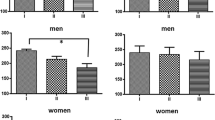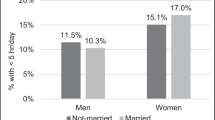Abstract
The relationship between psychosocial factors and psychophysiological reactions to a situation including stressors and relaxation in a working population was examined. A sample of 115 working men and women aged 26–65 was used. Each participant was examined at baseline, during deep breathing, experimentally induced stress and relaxation. Heart rate, exhalation carbon dioxide, oxygen saturation and blood pressure were monitored. Significant variations across experimental conditions were observed for all physiological variables. There was a pronounced lowering of blood pressure during deep breathing. Women showed significantly more pronounced physiological variation than men. Participants with low education reacted with significantly more systolic blood pressure elevation during the stressful conditions than others. The implication of the results for therapeutic and preventive exercises with deep breathing are discussed.
Similar content being viewed by others
References
Fried, R. (1993). The Psychology and Physiology of Breathing in Behavioral Medicine, Clinical Psychology and Psychiatry. New York: Plenum.
Gardner, W. (1994). Measurement of End-Tidal PCO2 and PO2. Biofeedback and Self-Regulation, 19, 103–113.
Horsten, M., Ericson, M., Perski, A., Wamala, S. P., Schenck-Gustavsson, K., & Orth-Gomér, K. (1999). Psychosocial factors and heart rate variability in healthy women. Psychosomatic Medicine, 61, 49–57.
Karasek, R. A. (1979). Job demands, job decision latitude, and mental strain: Implications for job redesign. Administrative Science Quarterly, 24, 285–308.
Karasek, R. A., & Theorell, T. (1990). Healthy work: Stress, productivity and the reconstruction of working life. New York: Basic Books.
Karlin, W. A., Brondolo, E., & Schwartz, J. (2003). Workplace social support and ambulatory cardiovascular activity in New York City traffic agents. Psychosomatic Medicine, 65, 167–176.
Kilbride, E., McLoughlin, P., Gallagher, C. G., & Harty, H. R. (2003). Do gender differences exist in the ventilatory response to progressive exercise in males and females of average fitness? European Journal of Applied Physiology, 89, 595–602.
Landsbergis, P., & Theorell, T. (2000). Measurement of psychosocial workplace exposure variables. In P. L. Schnall, K. B. Belkic, P. Landsbergis, & D. Baker (Eds.), Occupational medicine; The workplace and cardiovascular disease (pp. 163–188). Philadelphia: Hanley & Belfus.
Peter, R., Alfredsson, L., Hammar, N., Siegrist, J., Theorell, T., & Westholm, P. (1998). High effort, low reward, and cardiovascular risk factors in employed Swedish men and women: Baseline results from the WOLF Study. Journal of Epidemiology and Community Health, 52, 540–547.
Theorell, T., Alfredsson, L., Westerholm, P., & Falck, B. (2000). Coping with Unfair Treatment at Work–What Is the Relationship between Coping and Hypertension in Middle-Aged Men and Women? Psychotherapy and Psychosomatics, 69, 86–94.
Theorell, T. (1996a). The demand-control-support model for studying health in relation to work environment: An interactive model. In K. Orth-Gomér, & N. Schneiderman (Eds.), Behavioral medicine approaches to cardiovascular disease prevention (pp. 69–86). Mahwah, NJ: Erlbaum.
Theorell, T. (1996b). The demand-control-support model for studying health in relation to the work environment: An interactive model. In K. Ort-Gomér & N. Schneiderman (Eds.), Behavioral Medicine Approaches to Cardiovascular Prevention. New Jersey: Erlbaum.
Theorell, T., Perski, A., Akerstedt, T., Sigala, F., Ahlberg-Hulten, G., Svensson, J., et al. (1988). Changes in job strain in relation to changes in physiological state. A longitudinal study. Scandinavian Journal of Work, Environment and Health, 14, 189–196.
von Schéele, B. H. C., & von Schéele, I. A. M. (1999). The measurement of respiratory and metabolic parameters of patients and controls before and after incremental exercise on bicycle: Supporting the effort syndrome hypothesis? Applied Psychophysiology and Biofeedback, 24, 167–177.
Author information
Authors and Affiliations
Corresponding author
Rights and permissions
About this article
Cite this article
Schéele, I.v., Schéele, B.v., Hansson, G. et al. Psychosocial Factors and Respiratory and Cardiovascular Parameters During Psychophysiological Stress Profiling in Working Men and Women. Appl Psychophysiol Biofeedback 30, 125–136 (2005). https://doi.org/10.1007/s10484-005-4309-6
Issue Date:
DOI: https://doi.org/10.1007/s10484-005-4309-6




